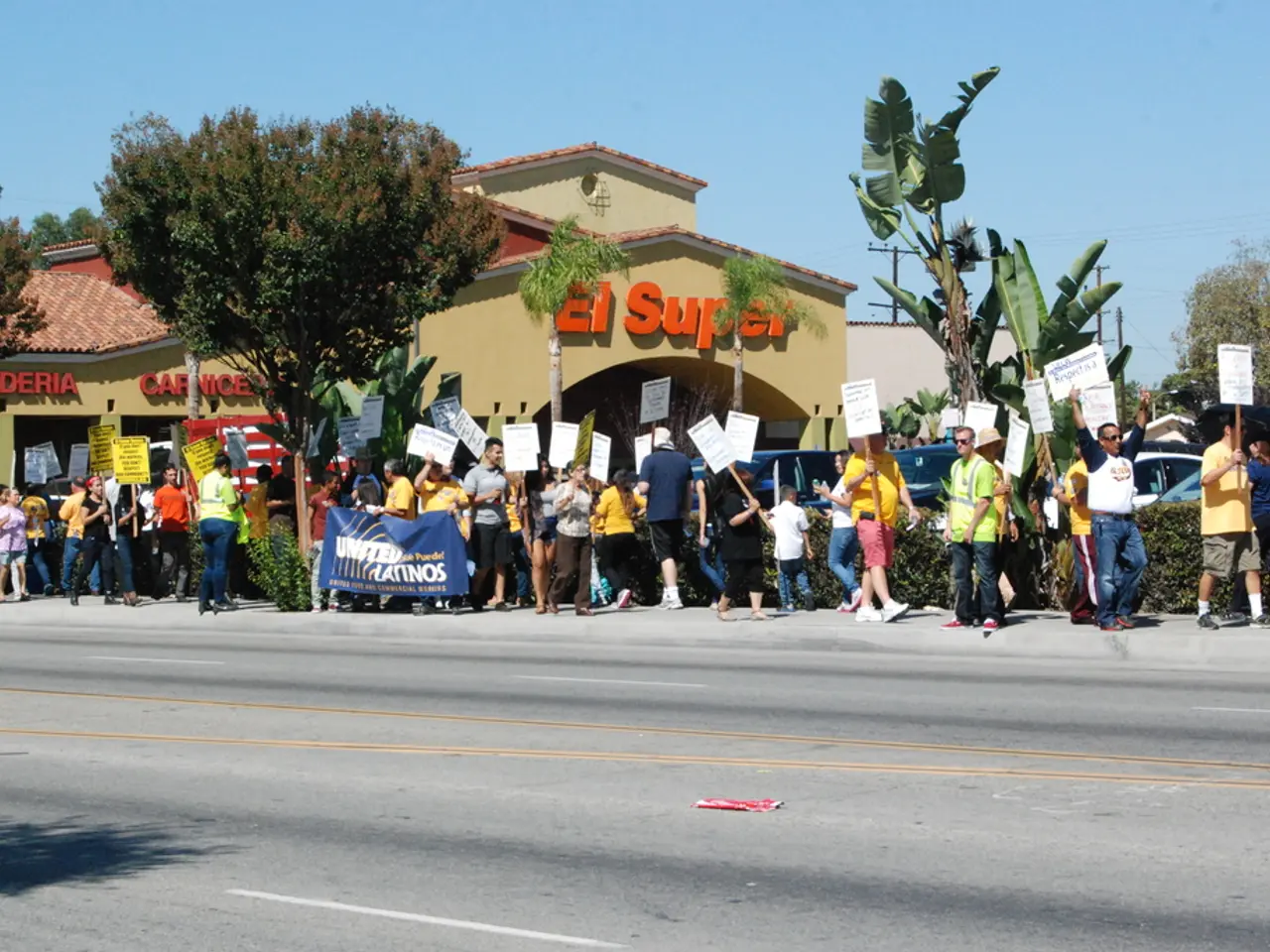Worldwide Rally for Scientific Progression
A Global Stand for Science: The London Science March of 2017
In April 2017, the streets of London echoed with chants for evidence-based policy after peer review, as thousands of scientists, educators, and supporters gathered for the London Science March. This event was part of the broader #MarchForScience movement, a global response to political challenges to scientific integrity.
The London Science March, held outside the Science Museum, was a symbolic and practical manifestation of this movement. It was a day when science enthusiasts, from comedians like Robin Ince and science communicators such as Jon Butterworth, joined together to raise awareness about science's societal impacts, promote funding for research, and oppose political interference in scientific processes.
The roots of the #MarchForScience movement can be traced back to concerns over political actions perceived to undermine scientific research and communication. Initiatives like the Stand Up for Science, founded by Colette Delawalla in 2025, expanded on these concerns by organizing protests and formal declarations opposing cuts to scientific grants and restrictions on research related to diversity and climate change.
The London Science March reflected this wave of scientific advocacy, aligning with international marches to demonstrate public support for science, emphasize its cultural and democratic importance, and demand that policymakers respect scientific evidence. It also built on historic efforts to improve public understanding and engagement with science, including strategies to communicate scientific knowledge accessibly, as recommended by reports like the UK’s Bodmer Report from 1985.
The impact of the #MarchForScience movement, as shown by events like the London march, includes:
- Raising public and political awareness of threats to scientific funding and the necessity of evidence-based decision-making.
- Fostering science communication and advocacy by empowering scientists and citizens to engage more actively with policy debates.
- Building momentum for institutional responses, such as the establishment of non-profits and declarations defending scientific integrity.
- Contributing to ongoing discussions about the role of science in democracy and society, especially in an era marked by misinformation and political challenges to factual discourse.
The London Science March was not just a local event. It was a global celebration of science, with parallel marches held in cities across the UK, including Bristol, Cardiff, Edinburgh, and Manchester, as well as more than 600 marches worldwide. The event even drew the attention of celebrities, with Dr Who star, Peter Capaldi, and science communicators like Helen Czerski in attendance.
The Twitter account for the London science march, @LDNsciencemarch, shared a photo expressing gratitude for the turnout at the event, which was covered by Ewan Callaway, as indicated by the tweet shared by Nature magazine. The event also passed by the Royal Society during the march, and a blog about the importance of science was written by Roger Highfield, an executive at the Science Museum.
In the face of the growth of 'fake news' and the downgrading of scientific objectivity, the London Science March stood as a testament to the power of science and the importance of evidence-based policy. It served as a reminder that science is not just a subject of study, but a vital tool for shaping our modern society.
References: [1] Delawalla, C. (2025). Stand Up for Science: A Declaration of Scientific Integrity. Available at: https://www.standupforscience.org/declaration [2] Bodmer, W. (1985). The Public Understanding of Science. Available at: https://royalsociety.org/~/media/policy/projects/public-understanding-of-science/the-public-understanding-of-science-report.pdf [3] National Academy of Sciences, National Academy of Engineering, & Institute of Medicine (2007). Rising Above the Gathering Storm, Revisited: Rapidly Approaching Category 5. Available at: https://www.nap.edu/read/11571/chapter/1 [4] Nisbet, M. C., & Scheufele, D. A. (2009). The Civic Functions of Science: The Role of Science in Democracy. Available at: https://www.annualreviews.org/doi/abs/10.1146/annurev.polisci.60.040807.140038
- The London Science March in 2017 advocated for evidence-based policy after peer review, aligning with the global #MarchForScience movement.
- This event was a response to political challenges to scientific integrity and aimed to raise awareness about science's societal impacts and promote funding for research.
- Science enthusiasts from various fields, such as comedy and science communication, joined forces to oppose political interference in scientific processes at the London Science March.
- The #MarchForScience movement had roots in concerns over political actions perceived to undermine scientific research and communication as early as 2025 with initiatives like Stand Up for Science.
- The movement also focused on opposing cuts to scientific grants and restrictions on research related to diversity and climate change.
- The London Science March was not just a local event, with parallel marches held in cities across the UK and over 600 worldwide, including Bristol, Cardiff, Edinburgh, and Manchester.
- Celebrities like Dr Who star, Peter Capaldi, and science communicators like Helen Czerski attended the London Science March.
- The event was covered by media outlets, with Ewan Callaway sharing a tweet about the event by Nature magazine, and Roger Highfield writing a blog about the importance of science for the Science Museum.
- The London Science March served as a reminder that science is not just a subject of study but a vital tool for shaping modern society in the face of 'fake news' and the downgrading of scientific objectivity.
- The event also highlighted the importance of policies supporting science education, mental health, fitness-and-exercise, health-and-wellness, and career-development, as these areas are crucial for personal-growth, lifelong-learning, skills-training, and creating a more informed and engaged public.
In addition, the London Science March brought attention to the importance of online-education, policy-and-legislation, politics, general-news, and climate-change, as these factors significantly impact science and research. Furthermore, the event addressed issues of crime-and-justice, entertainment, and social-media, highlighting their role in disseminating misinformation and undermining scientific objectivity. Lastly, the London Science March emphasized the role of science in sports, fitness-and-exercise, mental-health, and wellness, as sports-analysis and sports-science contribute to improved athlete performance and overall health.
In conclusion, the London Science March of 2017 acted as a global stand for science, demonstrating the public's support for evidence-based policymaking, the importance of scientific integrity, and the role of science in various aspects of modern life.




